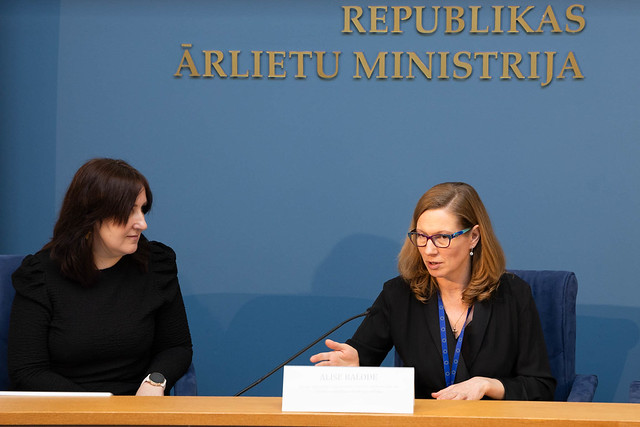On 21 February 2024, the Ministry of Foreign Affairs, in cooperation with the Latvian Platform for Development Cooperation (LAPAS), hosted a practical conference “Building a Humanitarian aid support system in Latvia”. Its aim was to promote capacity building among the Latvian non-governmental organisations (NGOs) and other humanitarian actors, as well as to inform about the possibilities of receiving support from international organisations such as the European Commission's Directorate General for Civil Protection and Humanitarian Aid Operations (DG ECHO) and the United Nations Office for the Coordination of Humanitarian Affairs (OCHA). Representatives from Lithuania, Estonia and Poland shared their experience and practical examples of humanitarian assistance. An exchange of ideas was also held on the need to develop a support system for humanitarian organisations in Latvia.
At the launch of the seminar, Alise Balode, Head of the Directorate for Economic relations, Trade and Development Cooperation at the Ministry of Foreign Affairs, thanked those present for their work in support of Ukraine and pointed out that humanitarian needs had reached unprecedented scale, so this was the right time to start a discussion on the establishment of a humanitarian aid system in Latvia. Alise Balode also underlined that this was a good opportunity for Latvian humanitarian workers to become acquainted with other countries’ humanitarian practices and develop new international cooperation.
The Director of LAPAS, Inese Vaivare noted: “In the current geopolitical context, it is important not only to participate in global processes through contributions to international organisations, but also to build the capacity of Latvian organisations, enterprises, local governments to provide humanitarian aid. Thus, we also build up our own resilience and increase our capacity to respond to a crisis situation. We very much welcome this initiative by the Ministry of Foreign Affairs to launch a dialogue on the establishment of a national support system for humanitarian aid providers.”
After Russia’s full-scale invasion of Ukraine, Latvian authorities, NGOs, municipalities, companies and other organisations became active humanitarian donors – donation campaigns, civic initiatives for material and financial support took place, as well as countless other good examples of society action. Support to Ukraine was a learning process because there are no large international organisations in Latvia with experience in providing coordinated humanitarian aid. At the same time, continued effort over two years has led to establishing sustainable cooperation with Ukrainian organisations, created significant experience for Latvia and its presence in the places where support to Ukraine is needed most.





